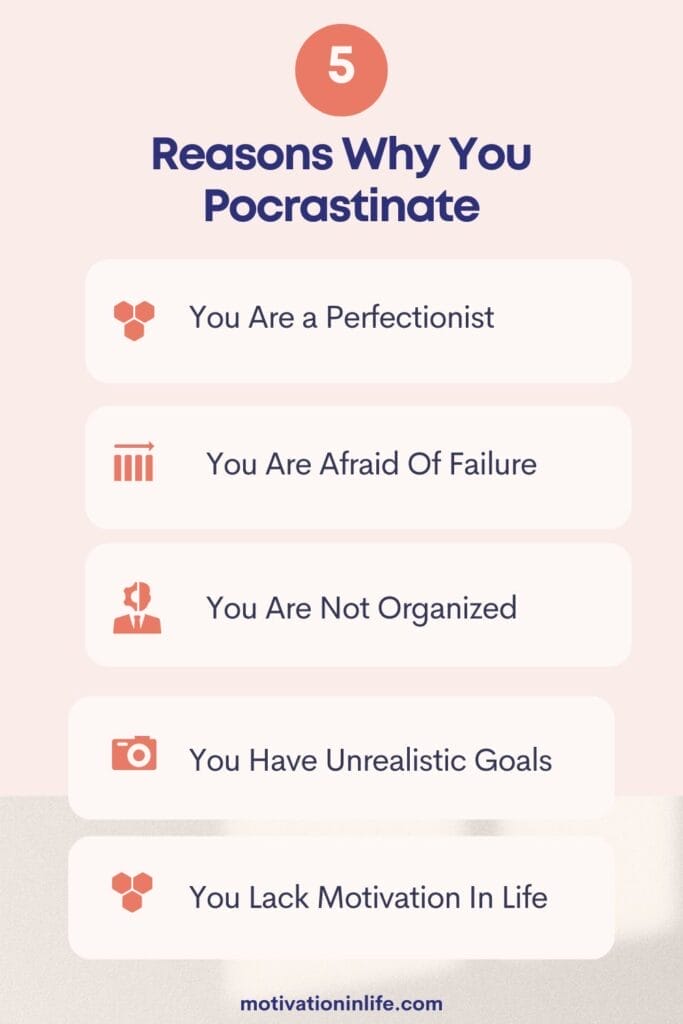Life Examples Of Procrastination: The Ultimate Guide Behind Procrastination (For The 40+)
“Procrastination Is The Art Of Keeping Up With Yesterday”
Don Marquis
Procrastination is a common issue that many people face and can be difficult to overcome, especially as you age. In this post, we will explore different life examples of procrastination to help you understand and overcome the habit of procrastinating.
If you’re anything like the average person, you have probably been guilty of procrastination at some point in your life. As the years go by, your to-do list keeps growing, but your motivation to tackle it seems to shrink.
From putting off getting out of bed in the morning to avoiding starting that big project at work, procrastination is something everybody is guilty of from time to time.
This habit of putting things off is more common than you might think. It can quietly slip into different areas of your life, especially as your responsibilities increase.
But why do we do it? And more importantly, how can we stop this habit of procrastinating?
In this guide to procrastination, we provide you with examples of procrastination to help you recognize how procrastination shows up in your daily routine.
By understanding why it happens, you can begin to take meaningful steps to overcome it. Let’s take a closer look at how this habit might be affecting you and how you can start to tackle it head-on.
Table of Contents
AFFILIATE DISCLOSURE
This post may contain affiliate links. We may earn a small affiliate commission at no extra cost if you click on them.
motivationinlife.com is also a participant in the Amazon Services LLC Associates Program, an affiliate advertising program designed to provide a means for sites to earn advertising fees by advertising and linking to Amazon.com and Amazon.in
We may earn a small commission for our endorsement, recommendation, testimonial, and/or link to any products or services from this website.

What Is The Meaning Of Procrastination?
Procrastination is an intentional delay of something that needs to be done, whether it’s an action or a task. The word derives from the Latin words “pro” meaning “forward” and “crastinus” meaning “of tomorrow.”
It can also refer to any behavior that is counterproductive in nature. For instance, when you avoid doing something you know you should do, or when you do not want to do something you are supposed to do.
It can lead to
- missed deadlines,
- lost opportunities,
- and even health problems.
So in simple words, procrastination is the act of delaying or postponing a task, typically what the mind perceives to be an unpleasant task.
People procrastinate when they are not motivated to start working on a job, or if they are under pressure to complete the task quickly. Some people procrastinate so much that they never start the work at all.
Some people use procrastination as a form of self-sabotage and do not want to do anything productive. There are many ways or examples of procrastination that people use to procrastinate for instance-
- Doing something else, such as playing video games,
- Watching TV, surfing the internet, etc.
- Making excuses
- Engaging in self-destructive behaviour such as smoking or drinking alcohol
- Withdrawing socially from friends and family.
Examples of procrastination include avoidance of doing a task that needs to be done. It is usually the result of feeling overwhelmed or unsure of how to complete the task. Procrastination can lead to feelings of
- guilt,
- anxiety,
- mental health issues
- and depression.
It can also interfere with work, school, and relationships.
If your lack of motivation is causing you to procrastinate please read our blog post 15 Proven Tactics Of How To Get Motivation Back In Life (For The 40+).

Different Types Of Procrastination
Procrastination comes in many forms. Some procrastinate by watching television instead of working on a project. Others procrastinate by cleaning their house instead of starting a task they don’t want to do.
And still, others procrastinate by sleeping instead of working on their business. Whatever the form, simply put, procrastination is a way of putting off something that needs to be done.
There are different types of procrastination, and each type has its own set of causes and consequences.
The Four Main Types Of Procrastination
Task-Avoidance: You’ve likely found yourself staring at a task that needs to be done, yet somehow, you just can’t seem to get started. Task avoidance is a common problem that can plague even the most well-intentioned person.
It can manifest itself in many different ways, such as
- procrastination,
- perfectionism,
- or simply putting off tasks that seem daunting.
Whatever the cause, task avoidance can have its negative effects, especially in your life beyond your forties when you have so many different responsibilities to tackle simultaneously.
Decision-making: How many times have you struggled with making a firm decision when needed? Decision-making is not an easy task, and most of us, despite years of experience behind us, struggle with decision-making.
Procrastination can come your way when it comes to making decisions, as, in the first place, it can be difficult to know when to act and when to wait. This can lead to indecision and frustration, especially when important choices need to be made.
Arousal-based: Are you prone to changing your plans at the spur of the moment? You may be guilty of arousal-based procrastination.
Arousal-based procrastination is a type of procrastination that stems from a desire for thrill or excitement. People who engage in arousal-based procrastination often seek out activities that are stimulating or challenging to avoid boredom.
Yet, this type of procrastination leads to risky behaviors, as people may take unnecessary risks to feel a sense of adrenaline. While arousal-based procrastination can be exciting, it can also be dangerous.
Fun-based: Not all types of procrastination are bad. Fun-based procrastination is one of them.
Fun-based procrastination occurs when you put off tasks that are not urgent to do something more enjoyable. This is the type of procrastination that can actually have some positive outcomes. It can help to relieve boredom and provide a much-needed break from more challenging tasks.
Journaling is a great habit to beat your habit to procrastinate. Download The Daily Journal we have designed for you using the templates at Creative Fabrica.
What Is Academic Procrastination- Examples Of Procrastination In Students
Once in our forties and beyond, this form of procrastination may not be directly applicable to us. Yet your habit of procrastinating may have its source in your childhood days in the form of academic procrastination.
Plus, if you have kids who go to school or are in college by understanding this concept you will be able to identify their patterns of procrastinating and help them overcome it.
Academic procrastination is a specific type of procrastination. It is characterized by delays in completing academic assignments. There are many reasons why students may engage in academic procrastination, such as
- lack of motivation,
- difficulty understanding the assignment,
- or simply not having enough time.
Whatever the reason, academic procrastination can have negative effects on a student’s grades and overall academic performance. If you want to know more about academic procrastination and its causes and remedies, you can read this blog post about academic procrastination.
Examples of Procrastination In Students
For many students, college is a time of newfound freedom. They can stay up late, sleep in, and party on weekends. With all this newfound free time, many students find themselves battling a common enemy: procrastination.
Procrastination can take many forms, from leaving homework until the last minute to putting off studying for exams. It can be a difficult habit to break but understanding what causes it can help.
Procrastination Examples At Work
When it comes to putting off work, there are a variety of procrastination examples at play in the office. From the coffee break that turns into an impromptu planning session for your child’s birthday party, to responding to personal emails while you should be drafting a presentation for your boss, everybody has been guilty of finding ways to avoid work at some point or another.
Procrastination is one of the most common productivity killers in the workplace. It can take many forms, from putting off important tasks to avoiding conflict or criticism to simply being disorganized. No matter the reason, procrastination can have a serious impact on your career.
If you’re struggling with procrastinating while at work, you are not alone. Please read our blog post on Setting Goals At Work For Success (For The 40+) to effectively accomplish your work goals.
Procrastination Examples in Personal Life
There are many examples of procrastination in your personal life. For instance,
- putting off eating healthy food
- cleaning the house,
- or putting off doing the laundry.
How many times have you put off doing your taxes, even though you know they need to be done? Similarly, maybe you keep meaning to exercise, but you just can’t seem to get yourself to the gym.
Each type of procrastination is associated with different outcomes and can result in reduced efficiency, poorer quality work, and increased stress levels.
Regardless of the reason, procrastination can have negative consequences on both your personal and professional life.

The Science Of Why You Procrastinate
We’ve all been there. That looming project that we really should get started on, but for some reason just can’t seem to bring ourselves to do it. Or the impending meeting for which you need to make notes and preparations, but do not feel like sitting down to work for it. Sounds familiar?
But, why do we procrastinate? The science behind it may surprise you.
Psychologists have long studied procrastination and have found that it has very little to do with laziness. In fact, procrastination is often caused by perfectionism or fear of failure.
There are many theories about why people procrastinate. Some believe it’s a way of coping with anxiety. Others believe it’s a form of self-damage.
It is at times difficult to perceive why you would avoid doing things you know you should be doing. Why do you keep watching TV when you should be working on that project?
The science of procrastination can help us understand why we do this and what we can do to stop it.
Most people procrastinate because:
- They have never done something before and don’t know how to do it properly.
- They are afraid of failure.
- They feel like they don’t deserve success or that they can’t handle it if they get it.
- They’re not sure what their next step should be and keep postponing taking action.
Procrastination is a common problem that can have negative consequences. It can lead to poor performance at work, school, or in other areas of life. It can also cause unnecessary stress and anxiety.
I personally feel that when your goals are not aligned with your purpose in life you tend to procrastinate. Please read our blog post What Is My Life Purpose Quiz To Reinvent Yourself (For The 40+), to identify your purpose in life for a productive midlife.

The Top 10 Lies You Tell Yourself When You Procrastinate
Have you ever told yourself a little white lie to justify your procrastination? Whether you’re convincing yourself that you work better under pressure or that you deserve a break, these lies are nothing more than excuses.
As anyone who has ever procrastinated knows, there are a million reasons, excuses, and rationalizations one tells to delay taking action. And while some of these may have a kernel of truth to them, at the end of the day, they’re nothing more than lies you tell yourself to make yourself feel better about not getting started.
Here Are The Top 10 Lies We Tell Ourselves And Glaring Examples Of Procrastination!!
- I don’t have time to do it right now
- I need to wait for the perfect moment.
- It’s not a big deal if I put it off until later.
- I’ll do it tomorrow.
- This is too hard, and it’s not worth the effort.
- I’m tired and need a break right now.
- This is too much work; there’s no way this is going to work out.
- My boss will never go for this idea anyway.
- I need to take care of something else first and then I can work on this project.
- I am not in the mood to complete the task now.
It is hard to believe that we can fool ourselves into thinking that we are being productive when in reality, we are just procrastinating. But it is true!
Lying to ourselves is something we all do from time to time. But when it comes to procrastination, we tend to tell ourselves some pretty convincing lies.

Pros And Cons Of Procrastination
Procrastination is often seen as a harmless habit. Yet, it can have significant consequences. When you procrastinate, you are putting off important tasks and instead choosing to do something less important or even fun.
This can lead to
- missed deadlines
- poor performance
- stress
- decreased productivity
- and even depression
These examples of procrastination show that procrastination can become a vicious cycle. The more you procrastinate, the harder it becomes to start working on a task.
Pros of Procrastination
Procrastination is often seen as a bad habit. Yet, there are some benefits to procrastinating. For instance, procrastinating can help you to avoid making rash decisions.
It can also give you time to reflect on what you want to do. Besides, procrastinating can help you to better manage your time by giving you time to introspect.
Further, it allows you to take advantage of opportunities that you otherwise would have missed. For example, if you procrastinate on starting a project, you may find that a better solution presents itself just before the deadline.
Additionally, procrastination can help relieve stress because it gives you more time to complete a task.

7 Examples Of Procrastination In The Life of a Procrastinator
According to a recent study, 40% of Americans admit to being chronic procrastinators. If you’re one of them, you’re not alone.
Here Are 8 Examples of the worst procrastination habits:
1. Putting things off until the last minute. This can lead to stress and poor work quality.
2. Putting things off because they’re too difficult.
3. Putting things off because you don’t know where to start
4. Putting things off because you’re perfectionistic
5. Failing to plan and organize your time. This can make it difficult to stay on track and get things done promptly.
6. Letting distractions get in the way of completing tasks.
7. Failing to plan ahead and not having a clear goal in mind. This can make it difficult to stay focused and motivated.
8. Putting off tasks that are boring or tedious.
We all know the feeling: you’re supposed to be working on a task, but instead, you find yourself scrolling through social media, watching TV, or cleaning your house.
Procrastination is something that we’ve all struggled with at one point or another, and it can be frustrating trying to figure out why we do it.
There are many reasons why people procrastinate, such as lack of time management skills, lack of clear goals, and personality traits.
Personality traits such as perfectionism and low levels of self-control can cause people to put off tasks.

How To Do a High-Level Assessment of Your Life To Combat Procrastination
If you find yourself procrastinating more often than you’d like, it may be time for a high-level assessment of your life. By taking a step back and looking at the big picture, you can identify areas that need improvement and make changes that will help you combat procrastination.
Here’s how to do a high-level assessment of your life:
- Identify your values and priorities.
- Determine what is important to you.
- Identify the areas in your life where you are procrastinating.
- Are you living in alignment with your values?
- Do you have a clear purpose or goal?
- Are you taking care of your physical and mental health?
Answering these questions can help you get to the root of your procrastination and find ways to combat it.
You may also be interested in reading our blog post on Books On Procrastination where we have compiled a list of 10 best books on procrastination that will help you overcome the habit of procrastinating.

Examples Of Procrastination-Key Takeaways
In conclusion, procrastination can mean different things to different people. It can be as simple as putting off doing the dishes or taking out the trash. It can also be more complex, such as avoiding working on your business or failing to chase your dreams in life.
No matter what shape it takes, procrastination is something that everyone can relate to. If you find yourself falling into the trap of procrastination, there are several things you can do to get back on track.
It is more important to stay aware of your mindset as you age as you get more complacent with your habits and it gets difficult to overcome them. When you add the constant pull and push of your daily grind this habit of procrastinating can hamper your productivity.
Procrastination is a habit that can be hard to break. However, by understanding the causes of procrastination and using some of the tips listed above, you can start to understand the underlying causes of this behavior and work out a strategy to overcome it.
Just remember, it takes time and effort to change any habit, so be patient with yourself. Breaking the procrastination habit is possible with a little bit of willpower and a lot of determination.
You may also be interested in reading our blog post on Positive Affirmations on Procrastination where we have compiled a list of affirmations that you can use in your daily life which will help you get over procrastination and achieve your goals in life.
Recommended Books To Overcome Procrastination
- The Procrastination Cure: 21 Proven Tactics For Conquering Your Inner Procrastinator by Damon Zahariades (Amazon.com | Amazon.in)
- Stop Procrastinating: A Simple Guide to Hacking Laziness, Building Self Discipline, and Overcoming Procrastination By Nils Salzgeber (Amazon.com | Amazon.in)
IF YOU LIKED READING THIS POST, PLEASE PIN ONE OF THESE IMAGES BELOW!
I will be grateful for your kind gesture. Thank you!











